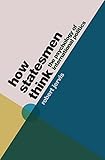How Statesmen Think : The Psychology of International Politics / Robert Jervis.
Material type: TextPublisher: Princeton, NJ : Princeton University Press, [2017]Copyright date: ©2017Description: 1 online resource (304 p.)Content type:
TextPublisher: Princeton, NJ : Princeton University Press, [2017]Copyright date: ©2017Description: 1 online resource (304 p.)Content type: - 9780691176444
- 9781400885336
- 327.101/9 23
- JZ1253 .J47 2017
- online - DeGruyter
- Issued also in print.
| Item type | Current library | Call number | URL | Status | Notes | Barcode | |
|---|---|---|---|---|---|---|---|
 eBook
eBook
|
Biblioteca "Angelicum" Pont. Univ. S.Tommaso d'Aquino Nuvola online | online - DeGruyter (Browse shelf(Opens below)) | Online access | Not for loan (Accesso limitato) | Accesso per gli utenti autorizzati / Access for authorized users | (dgr)9781400885336 |
Frontmatter -- Contents -- Acknowledgments -- Introduction -- PART I. Political Psychology -- 1. Understanding Beliefs -- 2. The Drunkard's Search -- PART II. Heuristics and Biases -- 3. Representativeness, Foreign Policy Judgments, and Theory‑Driven Perceptions -- 4. Prospect Theory: The Political Implications of Loss Aversion -- PART III. Political Psychology and International Relations Theory -- 5. Signaling and Perception: Projecting Images and Drawing Inferences -- 6. Political Psychology Research and Theory: Bridges and Barriers -- 7. Why Intelligence and Policymakers Clash -- 8. Identity and the Cold War -- PART IV. Psychology and National Security -- 9. Deterrence and Perception -- 10. Psychology and Crisis Stability -- 11. Domino Beliefs -- 12. Perception, Misperception, and the End of the Cold War -- Index
restricted access online access with authorization star
http://purl.org/coar/access_right/c_16ec
Robert Jervis has been a pioneering leader in the study of the psychology of international politics for more than four decades. How Statesmen Think presents his most important ideas on the subject from across his career. This collection of revised and updated essays applies, elaborates, and modifies his pathbreaking work. The result is an indispensable book for students and scholars of international relations.How Statesmen Think demonstrates that expectations and political and psychological needs are the major drivers of perceptions in international politics, as well as in other arenas. Drawing on the increasing attention psychology is paying to emotions, the book discusses how emotional needs help structure beliefs. It also shows how decision-makers use multiple shortcuts to seek and process information when making foreign policy and national security judgments. For example, the desire to conserve cognitive resources can cause decision-makers to look at misleading indicators of military strength, and psychological pressures can lead them to run particularly high risks. The book also looks at how deterrent threats and counterpart promises often fail because they are misperceived.How Statesmen Think examines how these processes play out in many situations that arise in foreign and security policy, including the threat of inadvertent war, the development of domino beliefs, the formation and role of national identities, and conflicts between intelligence organizations and policymakers.
Issued also in print.
Mode of access: Internet via World Wide Web.
In English.
Description based on online resource; title from PDF title page (publisher's Web site, viewed 30. Aug 2021)


